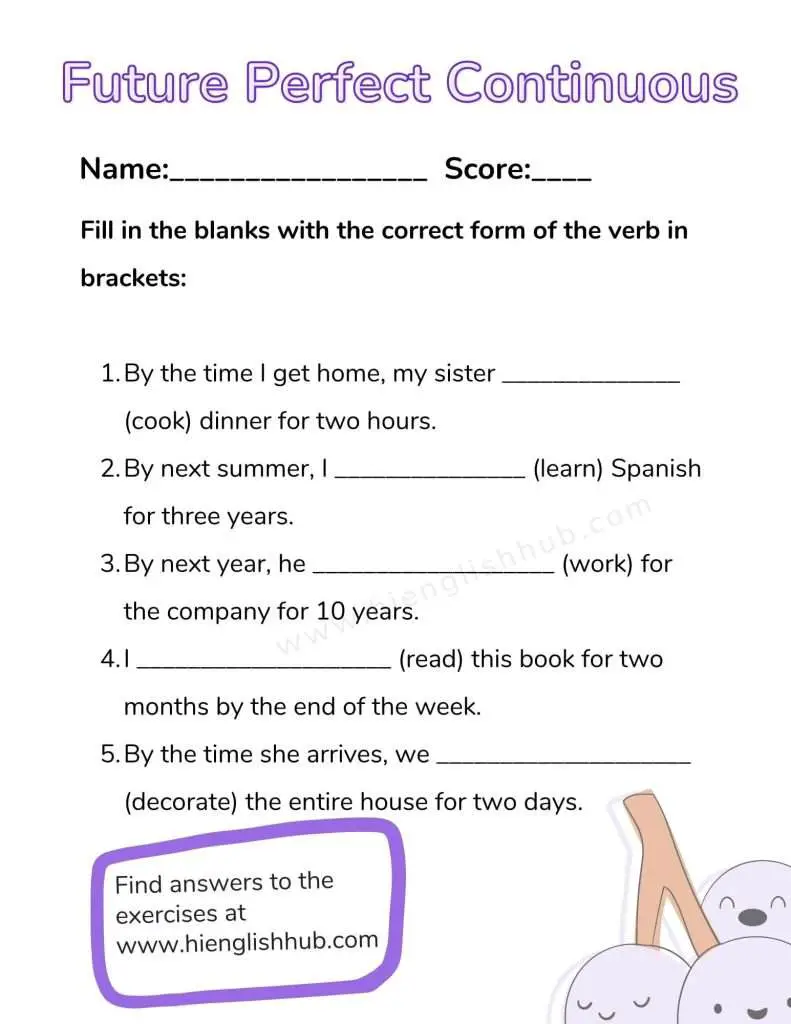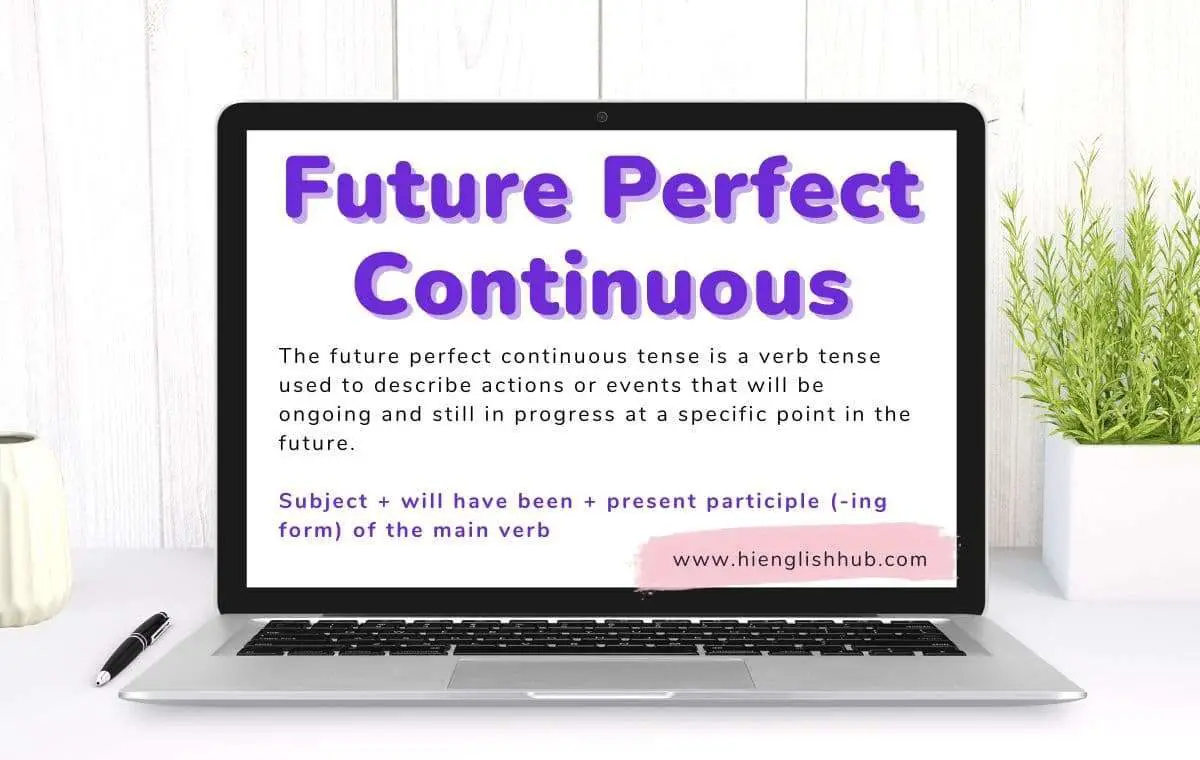You know how there are different tenses in English that help us talk about when things happen?
Like past, present, and future?
Well, one of those future tenses is called the future perfect continuous tense. It’s a bit of a mouthful, but don’t worry, it’s not too complicated.
In this post, we will explore the future perfect continuous tense—a verb tense that can seem tricky but is quite helpful and easy to understand.
Also read:
- Present Continuous
- Present Perfect
- Present Perfect Continuous
- Past Continuous
- Past Perfect
- Past Perfect Continuous
- Future Continuous
What Is The Future Perfect Continuous Tense?
The future perfect continuous tense is a verb tense used to describe actions or events that will be ongoing and still in progress at a specific point in the future.
It’s like looking ahead and saying, “At this point in time, I will have been doing this thing for this long.”
For example, you could say “By the time the party ends at midnight, we will have been dancing for six hours straight.” This means that the dancing will have been going on for six hours up until midnight, but may continue after that.
Oh, and by the way, you might also hear this tense referred to as the future perfect progressive. It’s the same thing, just a different name. Cool, huh?
Future Perfect Continuous Tense Formula
To form the future perfect continuous tense, you need to follow this formula:
Subject + will have been + present participle (-ing form) of the main verb.
For example, “I will have been studying for 2 hours.”
| Type | Example |
|---|---|
| Positive | I will have been working for 8 hours. |
| Negative | I will not have been working for 8 hours. |
| Interrogative | Will I have been working for 8 hours? |
| Positive Contractions | I’ll have been working for 8 hours. |
| Negative Contractions | I won’t have been working for 8 hours. |
20 Examples Of The Future Perfect Continuous Tense
- She will have been volunteering at the shelter for a year by the end of the month.
- By the time we arrive at the party, they will have been dancing for two hours.
- They will have been playing football for two hours when we arrive.
- They will have been waiting at the airport for five hours by the time the flight arrives.
- I will have been running my own business for five years in October.
- She will have been writing her book for a year next month.
- In November, he will have been coaching the team for four years.
- By the time the marathon ends at midnight, we will have been watching movies for 6 hours straight.
- She will have been teaching at the university for twenty years in September.
- By the time we get there, the concert will have been going on for four hours.
Future Perfect Continuous Tense Sentences
- By next month, I will have been working at this company for five years.
- When she arrives, we will have been waiting for two hours.
- By the end of this year, I will have been studying English for three years.
- We will have been hiking for 3 hours when we reach the summit.
- By the end of the week, they will have been working on the construction site for three weeks.
- By next week, I will have been practicing my guitar for 6 months.
- They will have been living in that house for ten years next month.
- She will have been traveling around the world for six months by the end of the year.
- By next summer, she will have been living in this city for ten years.
- By the end of the day, I will have been working on this report for eight hours.
When Not To Use The Future Perfect Continuous Tense
The future perfect continuous tense is not suitable for every situation in English grammar.
Here are some scenarios in which you should avoid using this tense:
| When Not To Use The Future Perfect Continuous Tense |
|---|
| Non-action verbs or stative verbs, such as “love,” “hate,” “like,” “believe,” and “understand,” do not use the future perfect continuous tense |
| When describing a single, completed action in the future |
| When the future action is a certainty and there is no need to emphasize the ongoing nature of the action |
Future Perfect Continuous Tense Exercises

Fill in the blanks with the correct form of the verb in brackets:
- By the time I get home, my sister ______________ (cook) dinner for two hours.
- By next summer, I _______________ (learn) Spanish for three years.
- By next year, he ___________________ (work) for the company for 10 years.
- I ____________________ (read) this book for two months by the end of the week.
- By the time she arrives, we ____________________ (decorate) the entire house for two days.
Answers:
- will have been cooking
- will have been learning
- will have been working
- will have been reading
- will have been decorating
What Is The Difference Between Future Perfect And Future Perfect Continuous?
| Future Perfect | Future Perfect Continuous | |
|---|---|---|
| Form | will have + past participle | will have been + present participle |
| Example | By next week, I will have finished my book. | By next week, I will have been writing my book for a month. |
| Emphasis | Emphasizes completion of an action | Emphasizes the duration of an ongoing action |
| Usage | Used to describe completed actions that will happen before a specific point in the future | Used to describe an ongoing action that will continue up to a specific point in the future |
Wrapping Up
Alright, we’ve come to the end of our discussion about the future perfect continuous tense.
I hope that you found this session helpful and informative.
Before you go, feel free to share this with your friends who might find this topic interesting, and don’t forget to follow Hi English Hub on Pinterest and Twitter for more language-related tips and tricks!
Thanks for joining me today!

